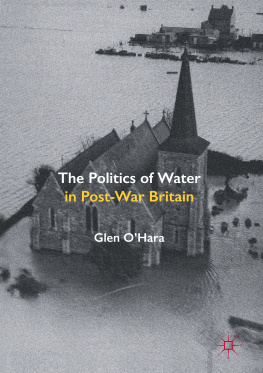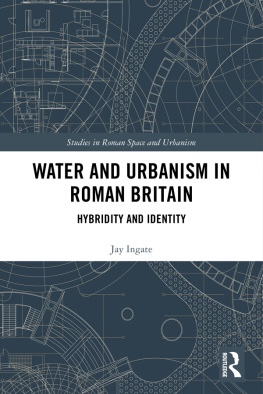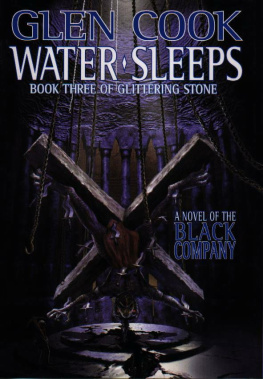1. Introduction: Water and History
Water, Life and Meaning
Water is life. It makes up about 60% of the human body and is a prerequisite for homo sapiens very existence. Although humans might live for 40 days without food, they are unlikely to survive for more than 3 days without water. H2O this strange combination of two hydrogen atoms with a single oxygen atom is required to keep bones and joints moving; digestion healthy; the liver and kidneys working well; and to release energy from every cell in the body.
That status as a prerequisite of life itself means that water has played a key role in shaping human history. Pre-human hominids and early humans alike relied on it: of the 11 sites where Australopithecus has been found, 9 contained water of some type. Early humans probably first started to move through the seasonal landscape and adapt their habits as they went in search of water. Many such groups, for instance those living at Trinil in Java, sought out river deltas and swamps as sources of food as well as drinking water which may explain, in terms laid out by the entomologist Edward O. Wilson, why humans still retain such a preference for watery savannah landscapes that contain many rivers and lakes. There is no doubt that waters management, control, direction and use must be one of the central stories of human history.
The British Isles seem at first sight a strange place about which to write another account of waters influence on human society. They are, for one thing, a rather wet region where water shortages overall are unknown. As the Liberal Partys Environment Conference was told in 1970, 40,000 million gallons were available from precipitation every year: humans used no more than 4,200 million gallons.
Water will, throughout this work, be treated as a locus of understandings and significance as well as a physical reality that will allow us to illuminate the recent past.
That allusiveness has both allowed, and demonstrates, the processes by which the ideological meaning of water has been freighted with significance. In the early modern period, water was often associated with womens power over various critical stages of life during which water takes on a special importance in their roles as midwives and as mothers nursing and washing infants, for instance.
Water has always haunted the human imagination as well as providing cathartic and transformative possibilities. Biblical narratives of flood and rain, and of drinking and immersion, are manifold and critical in Christian theology.
Emergent Historiographies of Water and Human Society
Water itself has long been a locus of historiographical innovation, one renewed in recent years as relations between humankind and the global liquid environment have come once more to the fore. Water is now hot, one maritime historian has recently written of that subjects rejuvenation, and other writers have been apt to agree.
Most of these texts do not, however, address the concept of water as a whole reaching across the range of provincial-to-transnational environmental negotiations evoked by such recent work as Matthew Evendens 2004 book on British Columbias Fraser River, the watershed of which stretches over the Canadian border into the State of Washington in the United States, and the story of which Evenden has narrated via the local, national and international forces that have shaped the river and have been shaped by it. No stronger justification could be found for the fusion of environmental, social and political domestic histories of water aimed at in this volume.
The Politics of Water in Post-War Britain will therefore seek to address what Terje Tvedt and Richard Coopey have termed the third layer of any water system: the institutional and conceptual dimension that interacts, uncertainly and at one remove, with the first two layers of analysis: namely, waters physical form and behaviour and the actual human modifications to the physical water landscape. Our concern will therefore be with what Tvedt and Coopey have dissected as the management practices and habits of thought or ideas about water and water control.
Such concepts are familiar, perhaps, in the history of the United States and of the Americas. Between the 1960s and the 1980s American historiography, under the influence of the emergent green movements of that era, rediscovered the relationship between the physical environment and human history that was evident from the Republics earliest days. The physical power of the modernist state played a critical role in this literature, in which reimagining the work of Norris Hundley on the early twentieth century remaking of the Colorado River was to the fore. But Hundley was soon joined by a crowd of scholars interested, firstly, in the remaking of the physical landscape to bring water to new human settlements, but also in the struggle for water rights in the dry American West and in the history of environmental perceptions and preservation.
Environmental histories of British waters have, in contrast, and notwithstanding the contributions of Hassan, Taylor and Trentmann, remained relatively underdeveloped. This is perhaps because of the famous two cultures caesura between scientific and artistic thinking, and in part because of the presumed identity between the environment and the countryside seen in prior studies.
There are rich opportunities for such work throughout British history. Ancient Britons worshipped water deities, and their holy sites were often collected around springs, or lakes such as Llyn Cerrig Bach and Llyn Fawr in Wales. The Romans often took over these sites, holding annual festivals devoted to water nymphs and other deities across southern England.
Water, Cleanliness and Efficiency in Modern British History
The concept of water cleanliness, and its link with public policy, is often traced back to the early nineteenth century. This was an era in which the accelerating growth of cities, the increase in closely packed populations, and the lack of regular flowing water and drainage were leading to an increase in diseases such as typhoid.
Further scientific and public health breakthroughs were also vital in encouraging policymakers to regulate both private water supply and the public management of discharges into water: the efforts of doctors such as John Snow, who reasoned his way by observation to the idea that cholera might be waterborne even before making his famous map of the 1854 London outbreak, were critical here.
Municipalisation or local public ownership, via which provincial boroughs and rural councils gradually took over Britains multifarious private water concerns, proceeded alongside and was to some extent perceived as simply another of the increased natural monopolies so important to the mid-Victorian economic boom. These monopolies were aimed at securing higher investment and thus the inevitably better services that prevailing political discourses believed to be the natural end of political as well as economic markets suitably regulated rivalries, to be sure, but free competition, allowing for local initiative, none the less. Legislation such as the 1847 Gasworks and Waterworks Clauses Acts only guided, rather than directed, councils efforts; the Acts limits on profit only applied to new companies; and, critically, there was no inspectorate and few means of enforcement.
These reforms may, however, have made the struggle for water resources more, rather than less, acute, as consumers, cities and their rural hinterlands argued over how much water was required and how to pay.










